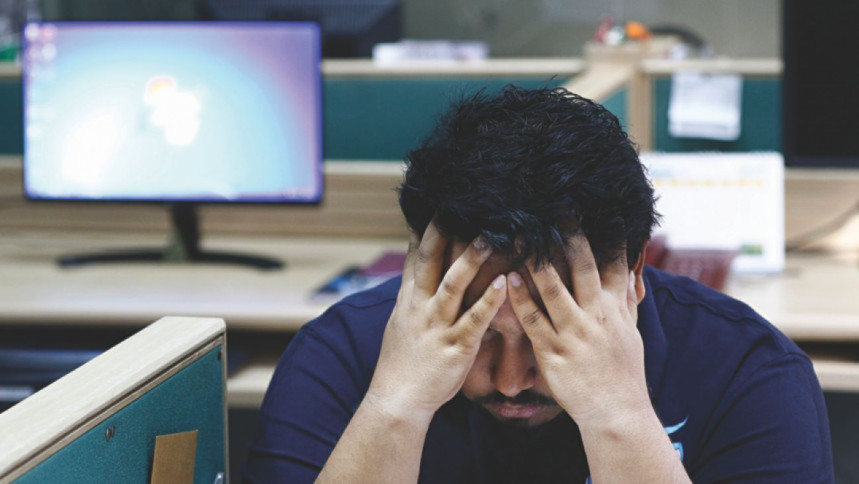84.6 percent university students faced mental health crisis during pandemic: Study

At least 84.6 percent university students faced mental health problems during the pandemic, as per a recent study.
The report also suggested that more female students (87.44 percent) were prone to depression than their male counterparts (80.38 percent).
The findings of the study, conducted by Aachol Foundation, a student based social organisation, were revealed during a virtual press conference on Saturday.
A survey was conducted on 2,552 respondents between September 12 to 26 this year for the study.
According to the study, three in four students (75.5 percent) lost their interest to study, whereas 53.5 percent expressed dissatisfaction with the online education system, of whom 31.9 percent were extremely dissatisfied.
The study found that 1,541 students faced mental health problems thinking about an uncertain future, 1,537 were suffering from loneliness, 1,058 were worried of session jam, and 1,028 suffered financial crises after losing their tuition.
DEALING WITH BOREDOM
Students participating in the survey said they tried to keep their morale up by engaging in different kinds of activities.
Among them, 62 percent of students watched movies or web series to keep themselves occupied, 39.5 percent maintained correspondence with their friends virtually or physically, 39.3 percent listened to music, 38.1 percent practiced religious rituals, 38.2 percent read books, 31.1 percent participated in online courses, 28.3 percent played online games, and 25.1 percent played indoor and outdoor games or sports.
During the pandemic, 77 percent of students faced difficulty sleeping and 36.7 percent could not sleep properly.
EXCESSIVE SCREEN-TIME
According to the study, more than one in three students (36.3 percent) spent seven to eight hours a day glued to a screen, 29.8 percent spent five to seven hours, while 25.3 percent spent three to five hours in a day.
This excessive dependence on screen has led to many of them suffering from mental illnesses, said the report.
The study revealed that 56.3 percent of students were found to suffer from headaches, 51 percent from insomnia, 38.2 percent did not eat properly, 40.99 percent were found to be suffering from backaches, 30.4 percent were gaining weight, and 19.3 percent suffered from migraines.
The study showed public university students faced a little more mental health issues (86.84 percent) than private university students (80.6 percent).
Tansen Rose, the founding president of the Aachol Foundation, while speaking to The Daily Star said, "We find that depression is more prevalent among students who do not sleep well. People who use electronic devices excessively have a higher rate of depression. We need to be aware of moderate sleep, proper use of devices, and worrying in general."
"Everyone needs to come forward to prevent unwanted social pressure on students. It is also necessary to be careful in degrading someone, disregarding them, comparing them with others, etc … We need to keep in mind that when a student suffers from emotional turmoil, anything can lead them to commit suicide. So, we have to be careful before talking to anyone," he said.
Founder and Executive Head of Innovation for Wellbeing Foundation Monira Rarman, while talking to The Daily Star said, "Parents (in Bangladesh) often try to marry off their daughters. Most of the guardians are thinking that as universities are closed their daughters are getting older … adding extra pressure on the female students."
Monira said, "Most of the parents hold unrealistic expectations over their children's heads ... To fulfill those expectations, most students suffer from mental health problems and the pandemic has made it worse."
Professor Mehjabin Haque of Educational and Counselling Psychology department at Dhaka University told The Daily Star, "Life has stopped in the pandemic. Students could not meet with their friends. They faced anxiety and depression. They were also worried about their uncertain future. Most of them face a financial crisis, and all that adds huge pressure on their mental health."
She said, "It is not possible to overcome these problems within a short time. As universities are reopening now, teachers should stay beside the students, and not give them additional pressure."
She also suggested maintaining communication with the friends and family members, not to live alone and overall lead a healthy life to ensure mental wellbeing.


 For all latest news, follow The Daily Star's Google News channel.
For all latest news, follow The Daily Star's Google News channel. 



Comments